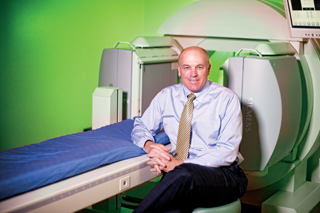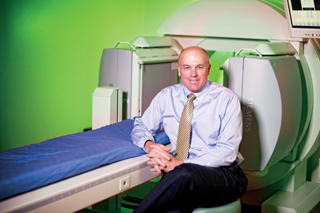

Executive edge: John Kelley
Lynn Bronikowski //June 1, 2012//
 John Kelley beams when he reads an email about a 15-year-old boy whose behavioral problems turned around after he underwent a brain scan at Denver-based CereScan Corp., where the former chief executive officer at McData Corp. is CEO.
John Kelley beams when he reads an email about a 15-year-old boy whose behavioral problems turned around after he underwent a brain scan at Denver-based CereScan Corp., where the former chief executive officer at McData Corp. is CEO.
“It’s satisfying to know we have had a positive impact on the life of a young person who was very close to being given up on or who could have easily ended up on the wrong side of the criminal justice system,” said Kelley, explaining that the teen had been misdiagnosed with ADHD before CereScan’s digital brain imaging turned up a bipolar diagnosis.
“He’s now rocking in school,” said Kelley, who took the reins at CereScan in July 2009. “We get these kinds of emails all the time.”
Kelley, the oldest of five children from a blue-collar family outside St. Louis, grew McData’s annual revenues from $200 million to $630 million before its sale to Brocade Communications Systems in 2007 for $1 billion. Prior to that he was executive vice president of networks at Qwest Communications, overseeing a staff of 26,000.
The graduate of the University of Missouri was taking a break from the corporate world following the McData deal when he heard about CereScan from his son, who is in marketing.
“I’m somebody who reads like crazy, so I started researching for a month and was totally fascinated with what could happen with the whole medical technology world. The brain is the final frontier,” said Kelley, who joined CereScan’s board of directors.
When CereScan’s former CEO committed suicide, Kelley stepped in as CEO, taking a nominal salary and heading a staff of 12.
“I don’t have to draw money out of this company – it’s all going to growth,” said Kelley, 62, whose plan is to open 10 CereScan sites across the country over the next 2 1/2 years. “I’ve invested modestly in the company and I manage a company that is making a difference in people’s lives. You get excited and feel rewarded about that.”
In 2010, CereScan proposed at the NFL players meeting that players get a baseline set of brain imaging at the start of their careers to determine the impact of any football injuries on their brains. He also visited officials in Washington, D.C., to propose brain imaging for soldiers returning from war zones.
“We’re the only ones doing brain imaging on the functional side,” said Kelley, explaining that a soldier could learn whether his symptoms stem from PTSD or a brain injury. “Over the next five to 10 years we have some tremendous opportunities for treating brain injuries and disorders of all sorts more effectively.”
The imaging also can detect the difference between Alzheimer’s disease and normal dementia.
“Each has its potential treatment,” Kelley said. “For the people who are looking for preventative, we can provide the tool. This is especially important with the baby boom population, as this technology provides intelligence to medical professionals.”
Kelley, a frequent keynote speaker on everything from leadership and best practices to corporate ethics, said there are things about the big corporate world he misses.
“The larger companies afford an opportunity to have a bigger impact on the community, so I miss that element,” said Kelley, who serves on the board of Mount St. Vincent Home. “But other than that, people are people – whether it’s 12 or 26,000. You only have so much time in a day to have a positive impact.”
























